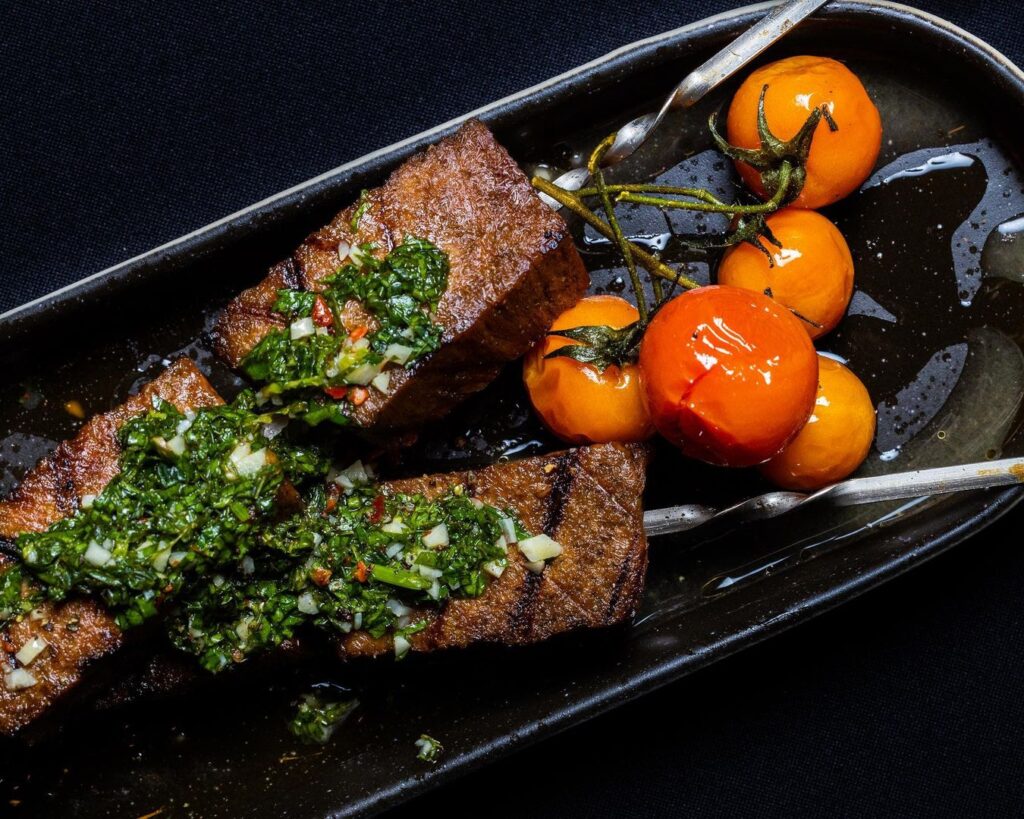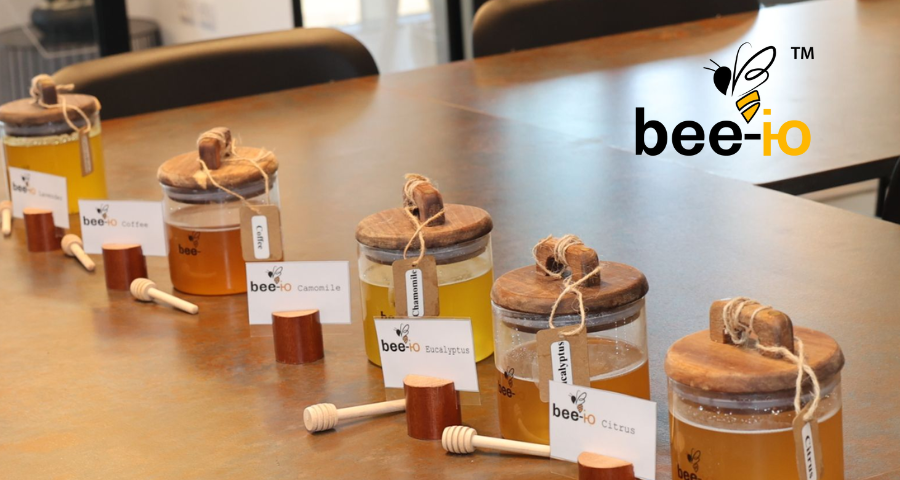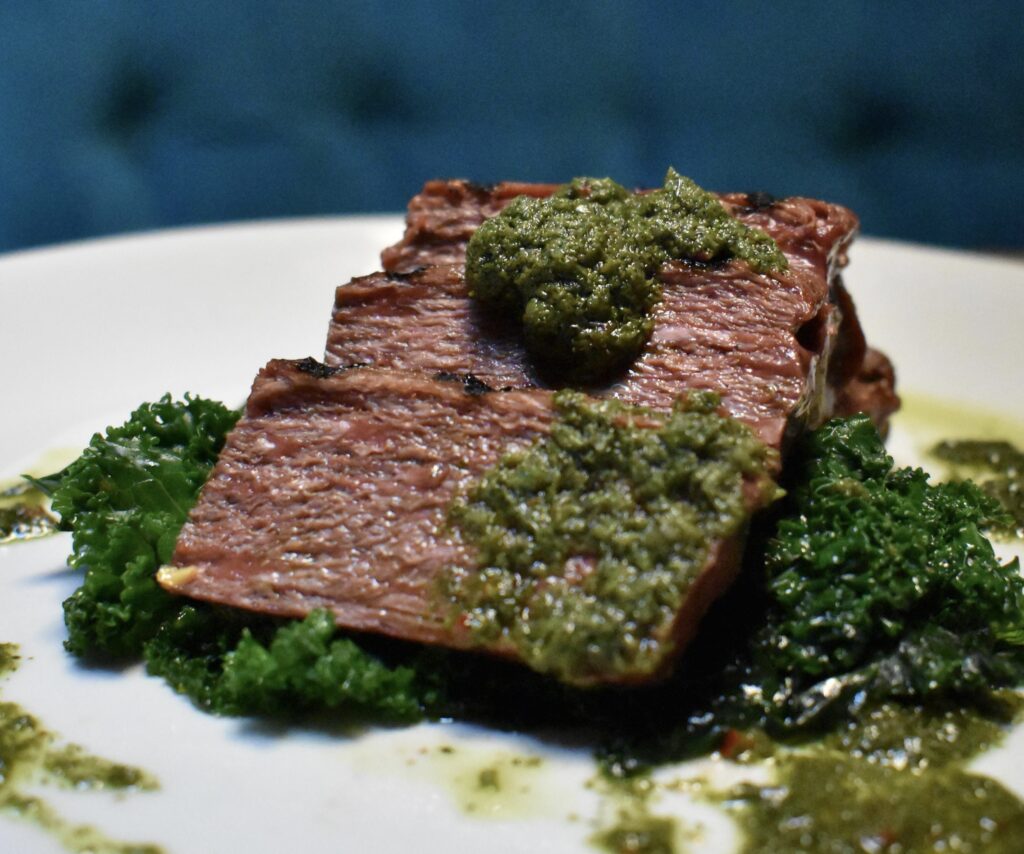
Last year I attended the opening of a vegan kosher restaurant run by Israeli chef Guy Vaknin, Anixi, which has gone to great lengths to serve Israeli and Mediterranean-style meat and fish dishes, but only using plant-based products. This would fall in line with Vaknin’s other restaurants, particularly Beyond Sushi, which offers an entire menu of delicious fishless sushi options.
It was at this Anixi opening event that I tried a piece of steak, or at least it looked and tasted like steak, that blew my mind. It was actually a plant-based item from Chunk, an Israeli startup looking to make delicious, nutritious, plant-based whole cuts of “meat” (which are completely pareve) that are kind to the environment, and accessible to all. The company has seemingly taken on beef as its first target, but pork, lamb, and poultry are next. That means we could presumably be tasting kosher, pareve “pork” in the near future.

Another sustainable innovation is Bee-IO, an Israeli company making honey with literally zero bees. We know that there’s been a struggle to maintain bee populations in the world, and this company is seeking to recreate the authentic honey flavor, viscosity, and texture without the use of the insect that we’ve relied on to make it for millennia, and already done so successfully. Bee-io enables a year-round supply of reasonably priced honey – allowing the bees to resume their traditional role of pollinating.

While not necessarily solving a sustainability issue, 7th Heaven Chocolate is similar to other Israeli-made food products in this article in that they don’t rely on animal products or byproducts to make something of top quality. Their multiple flavors of chocolate are all creamy that you’d swear was milk chocolate, but are all entirely pareve, using Oat and/or Coconut Milk to add creamy texture and flavor to their selection of chocolate bars. 7th Heaven Chocolate was recently featured at Kosherpalooza food festival and it may be of the best chocolate I’ve ever tasted, dairy or pareve. All of their chocolate bars are OU certified, pareve, and already available for sale today in the US. [This product is also available for sale today in Israel under the Panda Chocolate brand name].
3D-printed pareve meat is all the rage in Israel now and it’s more advanced than we even know.
Redefine Meat already has its kosher pareve “meat” products on the shelves in supermarkets throughout Israel and Europe, and is being served at Israeli kosher restaurants like Bodega, BeerBaazar, and Ca Phe Hanoi in Tel Aviv, Black Iron, Crave, Kinor Bakikar, Machne Asada, Nocturno, and Ruhan in Jerusalem, as well as a handful of others throughout Israel.

Redefine Meat uses AI, Machine Learning, and 3D printing of plant-based ingredients to bring their sustainable products to market at scale. The company already has a dozen products on the shelf including kosher pareve pulled beef, pulled pork, lamb kebab, tenderloin, and more.
Steakholder Foods is another 3D meat company that maintains facilities in Rehovot, Israel. The company is developing a slaughter-free solution for producing a variety of beef, chicken, pork, and seafood products — both as raw materials and whole cuts — as an alternative to industrialized farming and fishing. Its steaks and fish use real animal cells without killing or harming those animals, so technically these are not necessarily pareve (we’ll let the rabbis decide that) or vegetarian, as real animal cells are used to develop the basis for these lab-grown foods.
PM Bibi Netanyahu recently visited Steakholder Foods to taste cultivated fish made by the company’s 3D food printer, which are made with real fish cells:
Aleph Farms is another startup tackling similar issues with meat, that has already attracted investments from Ashton Kutcher and Leonardo DiCaprio, and the company has partnered with celebrity Chef Marcus Samuelsson on Aleph Cuts to create products and recipes using its cultivated steaks. who was quoted about the partnership: “It’s essential that we look for new ways to feed our planet sustainably, which is why I was attracted to the mission of Aleph Farms and being part, both as a chef and as an investor, in bringing delicious, cultivated meat to the table. Right now, it’s a pioneering movement and one that I think will only grow to be more important and increasingly commonplace in our lives. What once felt futuristic — like electric cars — soon becomes familiar. This is a game-changing moment in the industry to invest in the future, and I’m excited to partner with an innovative company like Aleph Farms.”
Why does this matter?
Given Israel’s penchant for innovations across many industries, it’s not surprising to see numerous Israeli companies tackle issues that affect the future of both food and the environment. Animal consumption was not a manufactured and industrialized process for most of human history. However, in the last 100 years or less, the industrialization of animal farming has made both the treatment of animals less humane as well as polluted the earth worse than fossil fuel emissions.
While we don’t expect to do without animal products in our lifetime, taking some of the burdens off of livestock for the betterment of and sustainability of humanity, advances in this industry are welcome – particularly the exciting advancements coming from Israel.







